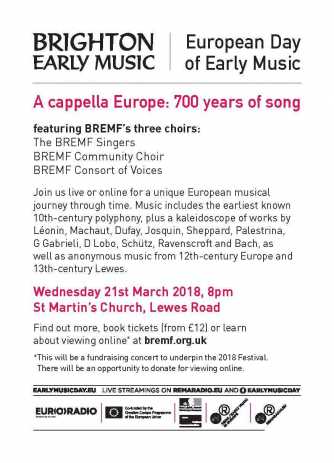Details
St Martin's Church
Lewes Road
Brighton and Hove
East Sussex
BN2 3HQ
England
Programme
Anonymous – Sancte Bonifati
Léonin – Haec dies
Anonymous – Resonet nostra Domino caterva
Anonymous – Regi perennis
Anonymous – Dei testis egregius
Anonymous – Beate martyr prospera
Anonymous – Vox nostra resonet
Anonymous – Pour avoir mon Dieu propice (Codex Calixtinus)
Guillaume de Machaut – La messe de Nostre Dame
Guillaume Dufay – Ave maris stella
Josquin Desprez – Praeter rerum seriem
John Sheppard – The Lord's Prayer
Giovanni Pierluigi da Palestrina – Tu es Petrus (á 6)
Duarte Lobo – Audivi vocem de caelo
~ Interval ~
Heinrich Schütz – Selig sind die Toten, SWV 391
Henry Purcell – Hear My Prayer, O Lord, Z.15
Johann Sebastian Bach – Jesu, meine Freude (motet), BWV 227
English Folk Songs – King Herod and the cock
English Folk Songs – Bold Reynard the fox
Thomas Ravenscroft – Sing we now merrily
Thomas Ravenscroft – Three country dances in one
Michael Wise – Counsel for married folks
Giovanni Gabrieli – Regina caeli
Performers
Deborah Roberts – Artistic Director
John Hancorn – Director
Andrew Robinson – Director
Joe Paxton – Director
BREMF Consort of Voices
BREMF Singers
BREMF Community Choir
Programme Note
Singing must be as ancient as speech – if not older – but writing down songs rather than passing them on orally is much more recent. Although very early forms of music notation have now been identified on ancient stone tablets, the earliest written music other than chant was discovered three years ago; a piece of two-part music dating from the 10th century. So this is our starting point, Sancte Bonifati, a short sacred song written in a style known as organum, with the voice parts moving in parallel motion; a style that was often improvised.
Our trip through the centuries moves on through medieval songs of pilgrims, monastic music from 13th-century Lewes, an extract from the earliest polyphonic mass by Machaut, richly complex but touchingly beautiful polyphony by the great Josquin des Prez, sublime but exuberant 16th-century music by Palestrina and yearning harmony from the 17th-century Portuguese composer Duarte Lobo. Then into the baroque with German texted music by Heinrich Schütz and JS Bach, and English by Henry Purcell.
A final set with the Community Choir illustrates the lighter side, with folk and drinking songs, before all three choirs come together in a grand finale: a 12-part, two choir setting of Regina caeli by the Venetian Giovanni Gabrieli.
All of the music is a cappella, meaning just human voices with no instrumental support. Singing is something everyone can do, and our three choirs show just what an enormous range of music there is to be sung. This programme covers at least 700 years of music intended for a variety of occasions and representing seven European countries. The main festival will cover 17 countries.
To quote the 16th-century English composer William Byrd:
Since singing is so good a thing, I wish all men would learn to sing.
William Byrd
This will be a fundraising concert in order to underpin the 2018 Festival, which needs more support than ever if we are to bring over a number of ensembles from around Europe! Whatever their feelings about the EU nobody can deny that we are geographically and culturally linked to Europe, and that will never change. In these uncertain days we can at least celebrate how much musical beauty we have shared since medieval times.
Please support this exciting event live if you can but if you can’t, we will be streaming the concert allowing music lovers from around the world to experience bremf in their own homes. We will also provide an opportunity for them to make a donation for viewing.

 Your events at Classical Events
Your events at Classical Events

